#fossil fuels
Text
"When the British Empire occupied Palestine and set about implementing the Balfour declaration, the fossil fuel of the day was not coal. It was oil. Promising deposits had been located in the countries bordering the Persian Gulf, and the central industrial project of the Mandate came to be the pipeline that brought crude oil all the way from Iraq, across the northern West Bank and the Galilee, to the refinery of Haifa. The Mandate as such cannot be understood outside the deepening control over the region in the pursuit of oil; and the Mandate used oil to reallocate land from Palestinians to Jews. In his forthcoming Heat: A History, a wonderfully rich history of high temperatures and fossil fuels in the Middle East, On Barak shows, among many other things, how the Yishuv wrested citrus production from Palestinians by linking up with the most modern circuits of technology: irrigating their orchards with fossil-fuelled pumps, loading their fruits on lorries, sending them over roads to ports, offloading them onto steamers to the European market – a symbiosis with the fossil empire by which the natives could be squeezed out of their iconic citriculture. The Mandate authorities systematically privileged the building of roads between colonies. Oil-based infrastructure tilted Palestine in the direction of the settlements on the coastal plains and further towards their patrons on the other side of the ocean."
25 notes
·
View notes
Text
No paywall version here.
"Two and a half years ago, when I was asked to help write the most authoritative report on climate change in the United States, I hesitated...
In the end, I said yes, but reluctantly. Frankly, I was sick of admonishing people about how bad things could get. Scientists have raised the alarm over and over again, and still the temperature rises. Extreme events like heat waves, floods and droughts are becoming more severe and frequent, exactly as we predicted they would. We were proved right. It didn’t seem to matter.
Our report, which was released on Tuesday, contains more dire warnings. There are plenty of new reasons for despair. Thanks to recent scientific advances, we can now link climate change to specific extreme weather disasters, and we have a better understanding of how the feedback loops in the climate system can make warming even worse. We can also now more confidently forecast catastrophic outcomes if global emissions continue on their current trajectory.
But to me, the most surprising new finding in the Fifth National Climate Assessment is this: There has been genuine progress, too.
I’m used to mind-boggling numbers, and there are many of them in this report. Human beings have put about 1.6 trillion tons of carbon in the atmosphere since the Industrial Revolution — more than the weight of every living thing on Earth combined. But as we wrote the report, I learned other, even more mind-boggling numbers. In the last decade, the cost of wind energy has declined by 70 percent and solar has declined 90 percent. Renewables now make up 80 percent of new electricity generation capacity. Our country’s greenhouse gas emissions are falling, even as our G.D.P. and population grow.
In the report, we were tasked with projecting future climate change. We showed what the United States would look like if the world warms by 2 degrees Celsius. It wasn’t a pretty picture: more heat waves, more uncomfortably hot nights, more downpours, more droughts. If greenhouse emissions continue to rise, we could reach that point in the next couple of decades. If they fall a little, maybe we can stave it off until the middle of the century. But our findings also offered a glimmer of hope: If emissions fall dramatically, as the report suggested they could, we may never reach 2 degrees Celsius at all.
For the first time in my career, I felt something strange: optimism.
And that simple realization was enough to convince me that releasing yet another climate report was worthwhile.
Something has changed in the United States, and not just the climate. State, local and tribal governments all around the country have begun to take action. Some politicians now actually campaign on climate change, instead of ignoring or lying about it. Congress passed federal climate legislation — something I’d long regarded as impossible — in 2022 as we turned in the first draft.
[Note: She's talking about the Inflation Reduction Act and the Infrastructure Act, which despite the names were the two biggest climate packages passed in US history. And their passage in mid 2022 was a big turning point: that's when, for the first time in decades, a lot of scientists started looking at the numbers - esp the ones that would come from the IRA's funding - and said "Wait, holy shit, we have an actual chance."]
And while the report stresses the urgency of limiting warming to prevent terrible risks, it has a new message, too: We can do this. We now know how to make the dramatic emissions cuts we’d need to limit warming, and it’s very possible to do this in a way that’s sustainable, healthy and fair.
The conversation has moved on, and the role of scientists has changed. We’re not just warning of danger anymore. We’re showing the way to safety.
I was wrong about those previous reports: They did matter, after all. While climate scientists were warning the world of disaster, a small army of scientists, engineers, policymakers and others were getting to work. These first responders have helped move us toward our climate goals. Our warnings did their job.
To limit global warming, we need many more people to get on board... We need to reach those who haven’t yet been moved by our warnings. I’m not talking about the fossil fuel industry here; nor do I particularly care about winning over the small but noisy group of committed climate deniers. But I believe we can reach the many people whose eyes glaze over when they hear yet another dire warning or see another report like the one we just published.
The reason is that now, we have a better story to tell. The evidence is clear: Responding to climate change will not only create a better world for our children and grandchildren, but it will also make the world better for us right now.
Eliminating the sources of greenhouse gas emissions will make our air and water cleaner, our economy stronger and our quality of life better. It could save hundreds of thousands or even millions of lives across the country through air quality benefits alone. Using land more wisely can both limit climate change and protect biodiversity. Climate change most strongly affects communities that get a raw deal in our society: people with low incomes, people of color, children and the elderly. And climate action can be an opportunity to redress legacies of racism, neglect and injustice.
I could still tell you scary stories about a future ravaged by climate change, and they’d be true, at least on the trajectory we’re currently on. But it’s also true that we have a once-in-human-history chance not only to prevent the worst effects but also to make the world better right now. It would be a shame to squander this opportunity. So I don’t just want to talk about the problems anymore. I want to talk about the solutions. Consider this your last warning from me."
-via New York Times. Opinion essay by leading climate scientist Kate Marvel. November 18, 2023.
#WE CAN DO THIS#I SO TRULY BELIEVE THAT WE CAN DO THIS#WE CAN SAVE OURSELVES AND THE WORLD ALONG WITH US#climate crisis#united states#climate change#conservation#hope posting#sustainability#climate news#climate action#climate emergency#fossil fuels#global warming#environmentalism#climate hope#solarpunk#climate optimism#climate policy#earth#science#climate science#meteorology#extreme weather#renewable energy#solar power#wind power#renewables#carbon emissions#climate justice
33K notes
·
View notes
Text
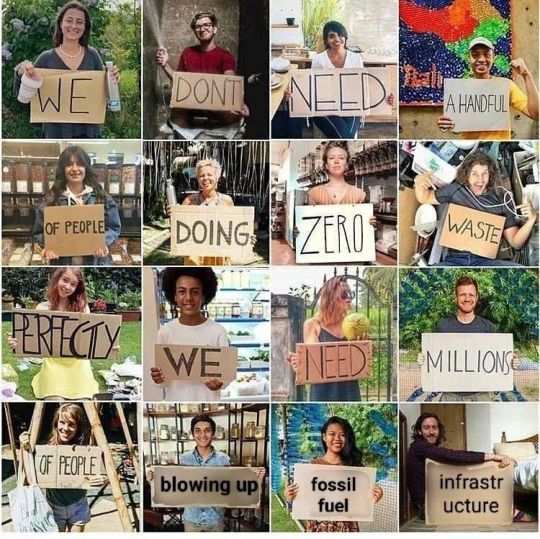
#fossil fuels#infrastructure#global warming#environmentalism#memes#meme#antifascist#co2 emissions#co2#methane#carbon dioxide#jerkmillionaires#jerkbillionaires#jerktrillionaires#eat the rich#eat the fucking rich#ausgov#politas#auspol#tasgov#taspol#australia#neoliberal capitalism#fuck neoliberals#anthony albanese#albanese government#fuck the gop#fuck the police#fuck the supreme court#fuck the patriarchy
7K notes
·
View notes
Text

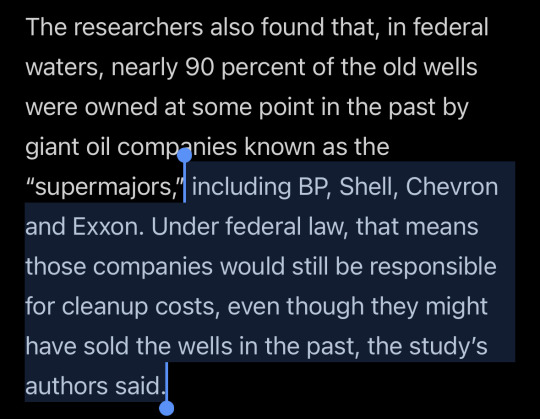
Source
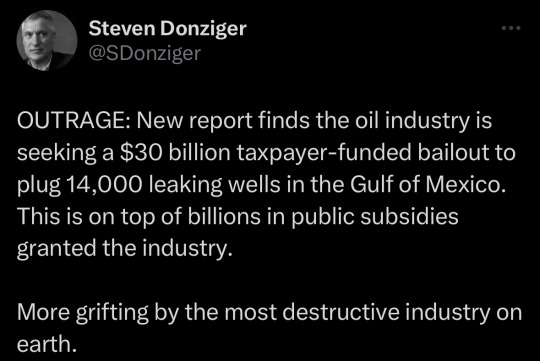
#climate change#fossil fuels#politics#us politics#government#the left#environment#water#clean water#energy#twitter post#progressive#green new deal#ban fossil fuels#environmentalism#environmental justice
12K notes
·
View notes
Text
There it is, the cat is out of the bag, the reason why they have been attacking Gaza and wanting to do an ethnic cleansing
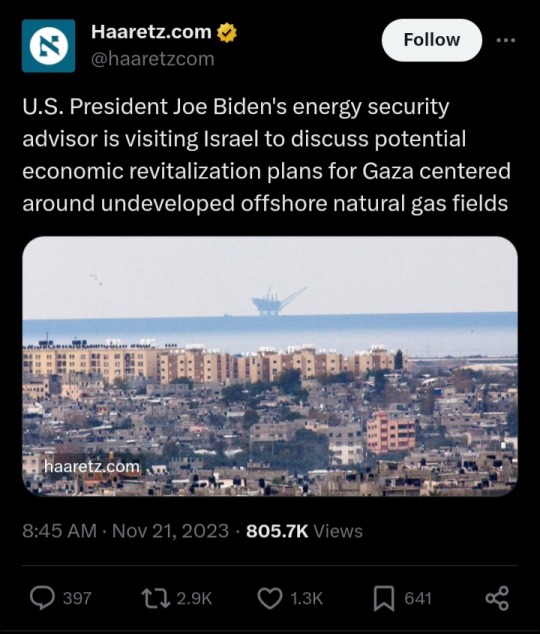
Stealing natural resources, just as they have been doing it in Congo and other places
#genocidal lunatics#fossil fuels#climate change#Gaza#social justice#free Palestine#us imperialism#israeli crimes#ethnic cleansing#Palestine
5K notes
·
View notes
Text
2K notes
·
View notes
Text
Plastic producers have known for more than 30 years that recycling is not an economically or technically feasible plastic waste management solution. That has not stopped them from promoting it, according to a new report.
“The companies lied,” said Richard Wiles, president of fossil-fuel accountability advocacy group the Center for Climate Integrity (CCI), which published the report. “It’s time to hold them accountable for the damage they’ve caused.”
Plastic, which is made from oil and gas, is notoriously difficult to recycle. Doing so requires meticulous sorting, since most of the thousands of chemically distinct varieties of plastic cannot be recycled together. That renders an already pricey process even more expensive. Another challenge: the material degrades each time it is reused, meaning it can generally only be reused once or twice.
The industry has known for decades about these existential challenges, but obscured that information in its marketing campaigns, the report shows.
The research draws on previous investigations as well as newly revealed internal documents illustrating the extent of this decades-long campaign.
Industry insiders over the past several decades have variously referred to plastic recycling as “uneconomical”, said it “cannot be considered a permanent solid waste solution”, and said it “cannot go on indefinitely”, the revelations show.
The authors say the evidence demonstrates that oil and petrochemical companies, as well as their trade associations, may have broken laws designed to protect the public from misleading marketing and pollution.
1K notes
·
View notes
Text
#clean energy#green energy#sustainability#climate change#environment#good news#hope#climate anxiety#fossil fuels
734 notes
·
View notes
Text
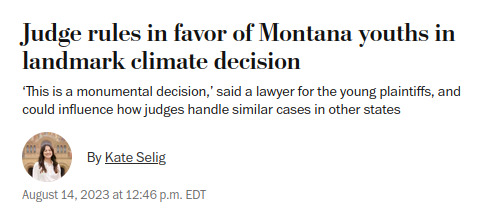

In the first ruling of its kind nationwide, a Montana state court decided Monday in favor of young people who alleged the state violated their right to a “clean and healthful environment” by promoting the use of fossil fuels.
The court determined that a provision in the Montana Environmental Policy Act has harmed the state’s environment and the young plaintiffs, by preventing Montana from considering the climate impacts of energy projects. The provision is accordingly unconstitutional, the court said.
The win, experts say, could energize the environmental movement and reshape climate litigation across the country, ushering in a wave of cases aimed at advancing action on climate change.
(Source: Washington Post, August 2023)
2K notes
·
View notes
Text



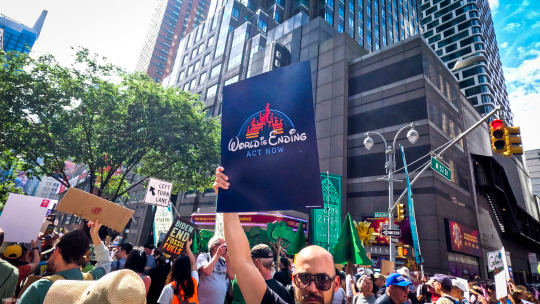
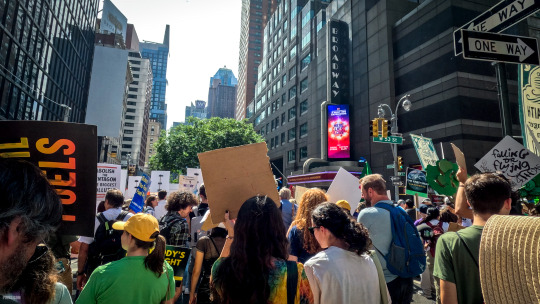

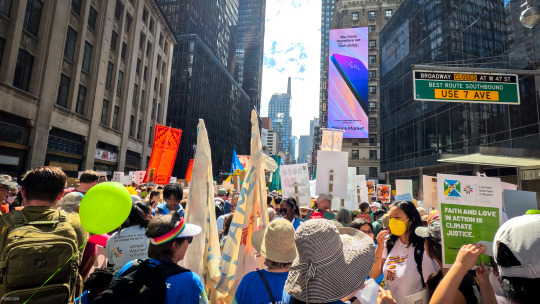
Climate Change March & Rally in New York City, September 17th, 2023.
#nyc#original photography#new york city#new york#photographers on tumblr#climate change#climate crisis#climate emergency#climate action#climate protest#global warming#fossil fuels#environment#protest#end fossil fuels#climate and environment#the lorax#lorax
2K notes
·
View notes
Text
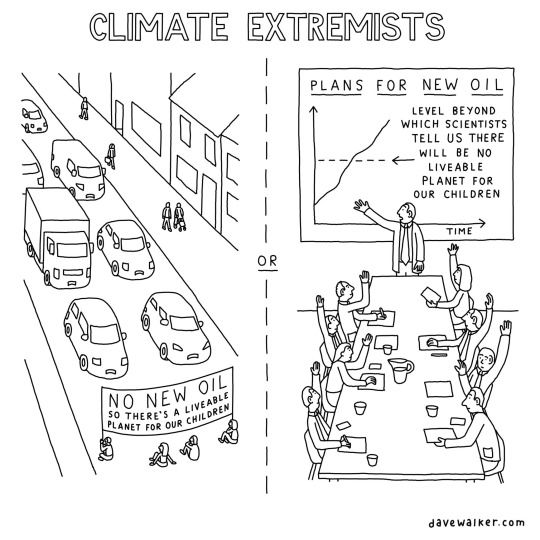
818 notes
·
View notes
Text
"Governor Janet Mills announced that Maine has, two years ahead of time, surpassed its goal of installing 100,000 new heat pumps by 2025, a milestone that represents significant progress in reducing Maine’s reliance on heating oil, lowering heating costs, and curbing harmful carbon emissions.
To continue Maine’s momentum, Governor Mills also unveiled a new target: installing another 175,000 additional heat pumps in Maine by 2027, thereby bringing the number of heat pumps installed in Maine homes, businesses, and public buildings during her time in office to 275,000.
If this target is achieved, Maine would have more than 320,000 heat pumps in total installed across the state.
Heat pumps can be thought of as temperature recycling machines. They are filled with refrigerant fluid and contain a compressor, and they work by extracting excess heat and moving it around, either in or out of a house depending on whether it’s hot or cold.
It’s believed they work best in hot weather, but in February, Maine’s temperatures in some places plummeted during a cold snap to -60°F. Efficiency Maine, which aided in the state’s adoption of heat pumps by organizing rebates for customers under the provisions of the Inflation Reduction Act, did a survey of owners they had helped the previous year.
Many of [the heat pump owners] reported they were comfortable and warm, and offered to bring up the fact that by February they had already saved hundreds of dollars on home heating systems, over boilers, gas furnaces, and heating oil.
“We are setting an example for the nation,” said Mills at the announcement event. “Our transition to heat pumps is… curbing our reliance on fossil fuels, and cutting costs for Maine families, all while making them more comfortable in their homes—a hat trick for our state.”
The transition began in 2019 with bipartisan support of the Legislature, when Governor Mills enacted laws setting ambitious targets for transitioning to renewable energy and reducing greenhouse gas emissions."
-via Good News Network, July 31, 2023
#maine#united states#us politics#heat pump#fossil fuels#carbon emissions#climate crisis#refrigerant#heating and cooling#air conditioning#heater#cold snap#good news#hope#hope posting#janet mills
3K notes
·
View notes
Text
Anyone else ever feel like bludgeoning oil executives and politicians to death with a rusty pipe over what they’ve doomed us all to?
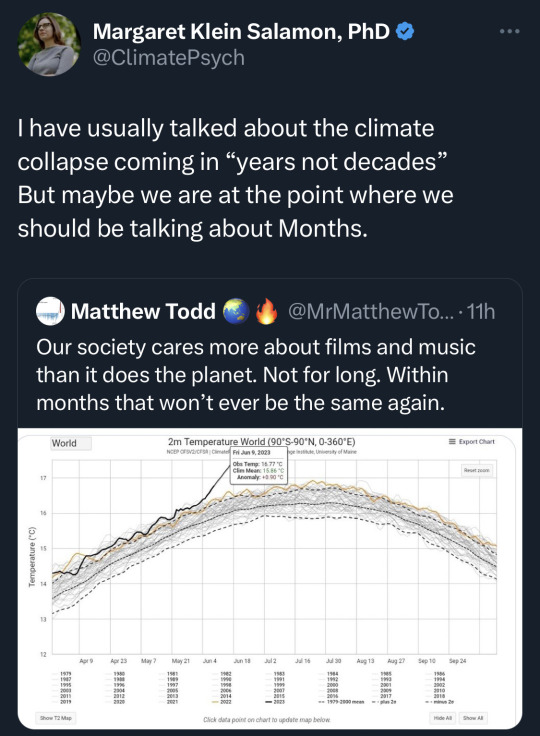
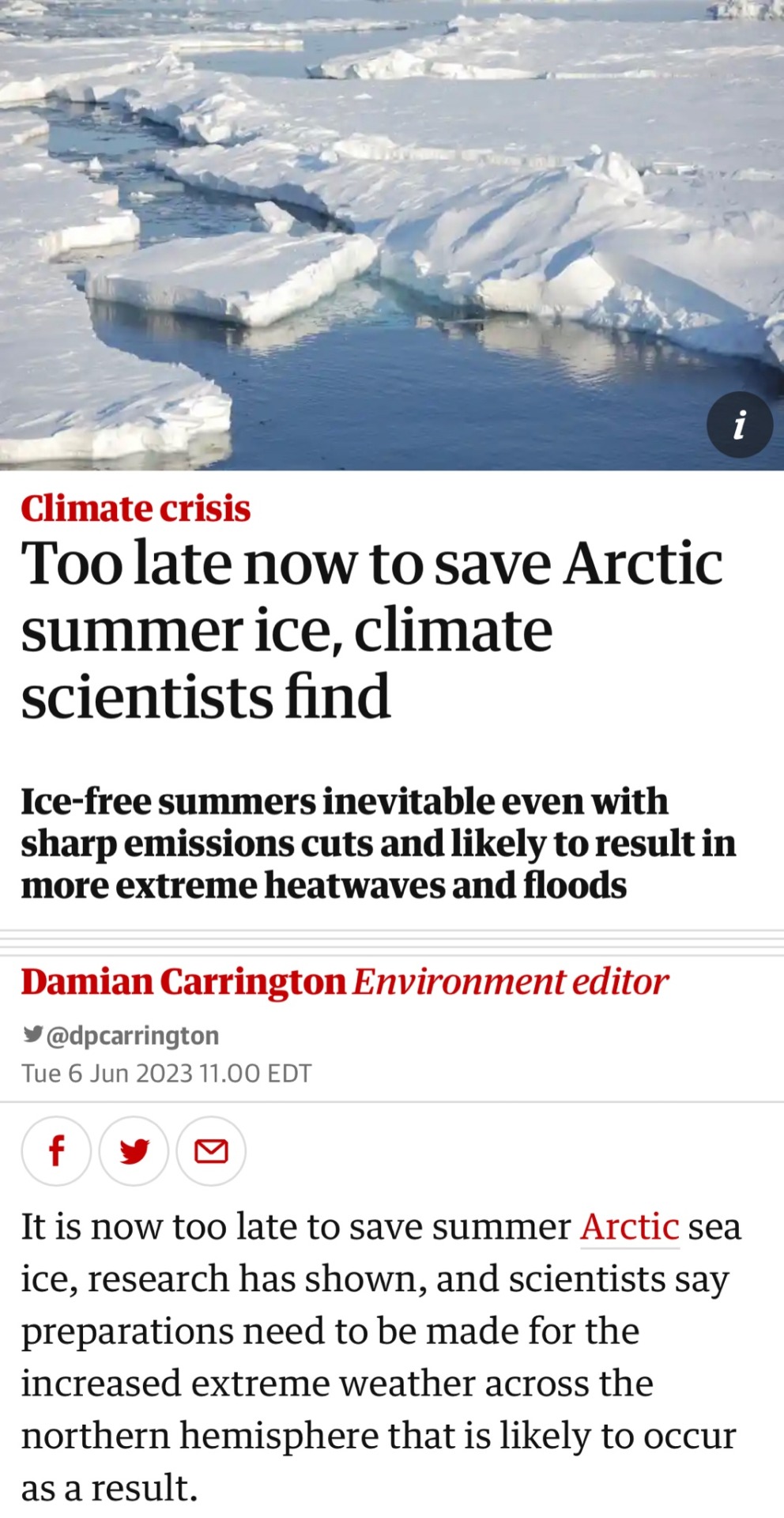
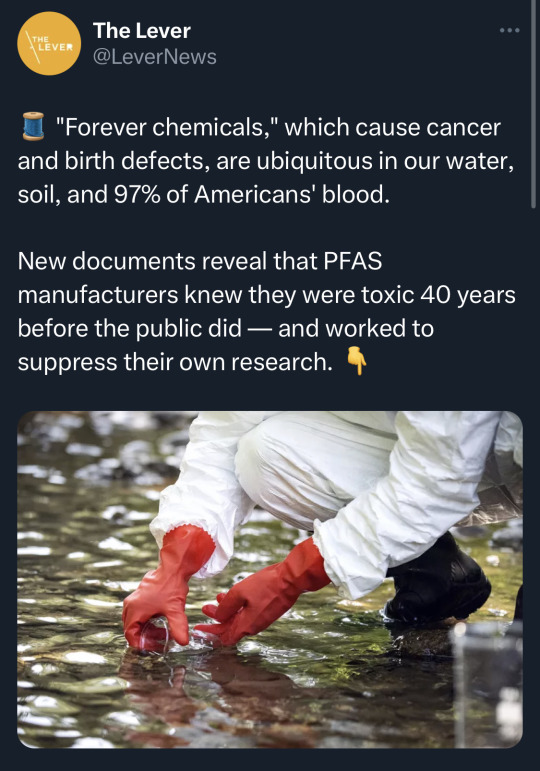
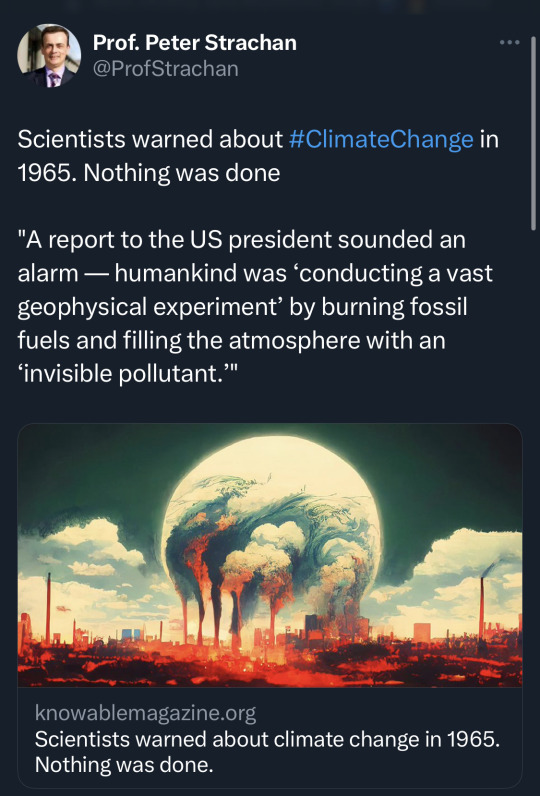
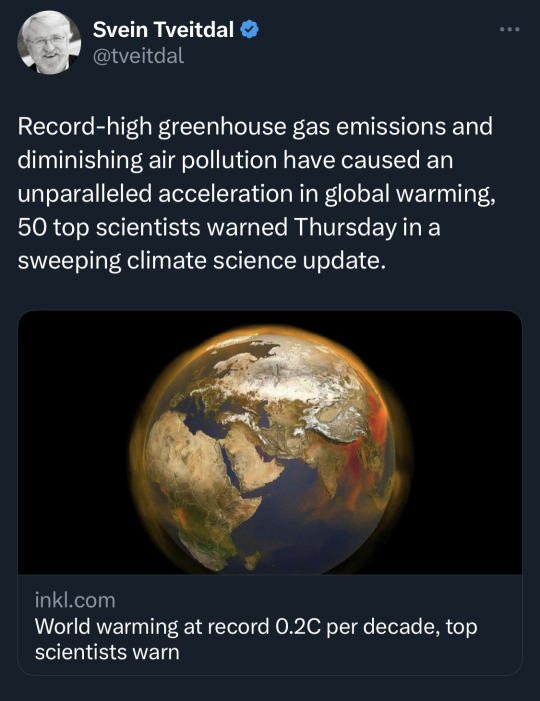


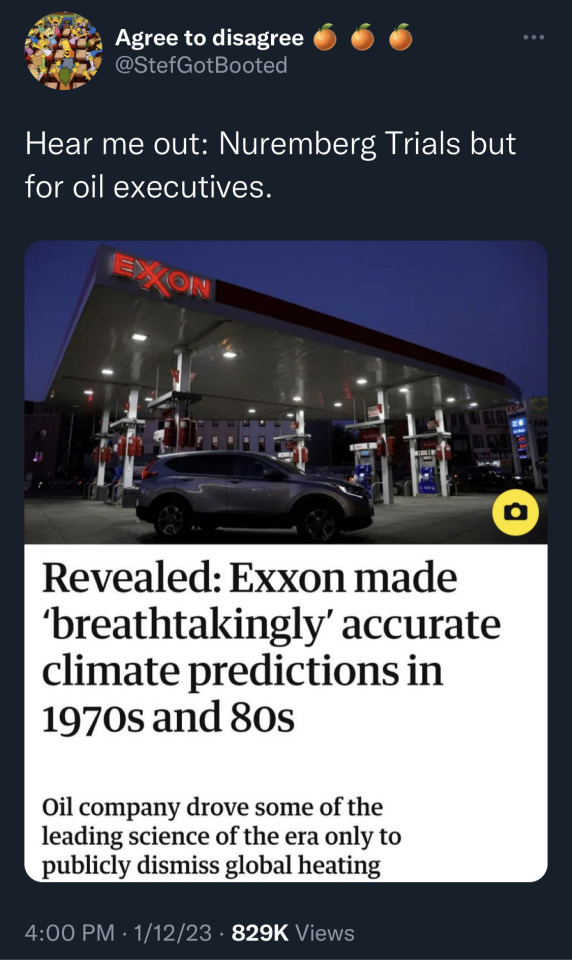
Capitalism is a death sentence for the human race
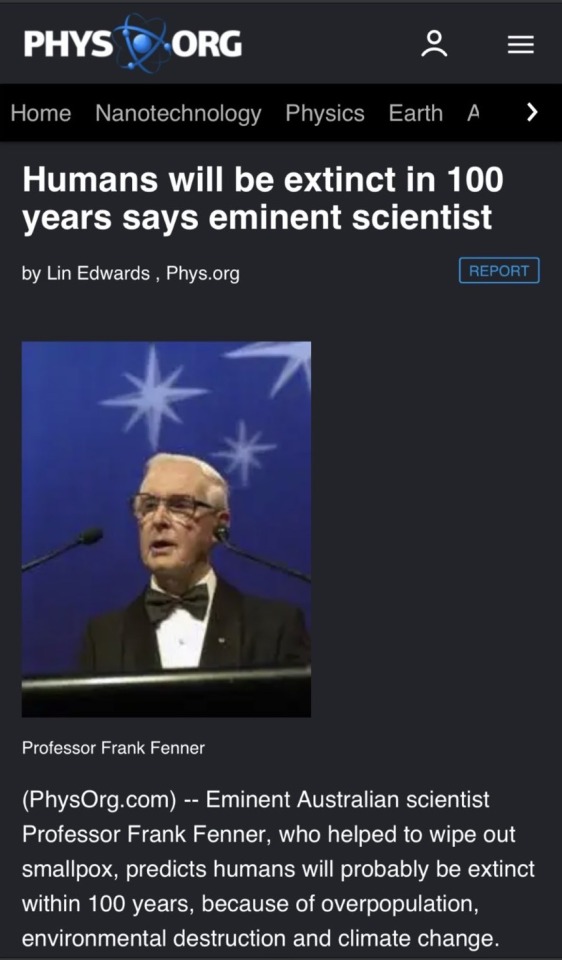
#climate crisis#climate change#climate news#wildfires#canada wildfires#new york#capitalism#eat the rich#joe biden#us politics#wealth inequality#late stage capitalism#vote#climate emergency#climate action#climate war#just stop oil#fossil fuels#oil industry#there is no planet b#ice cap
941 notes
·
View notes
Text
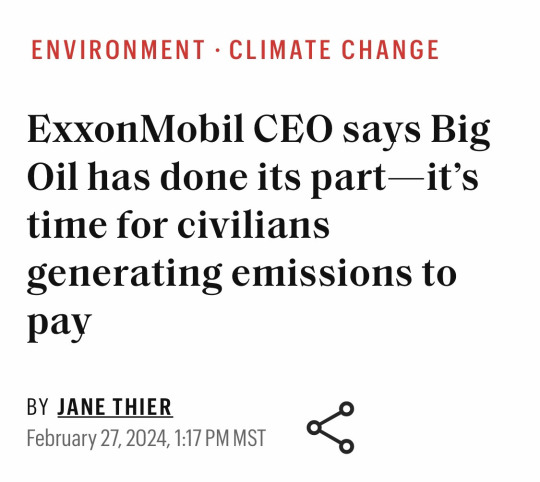
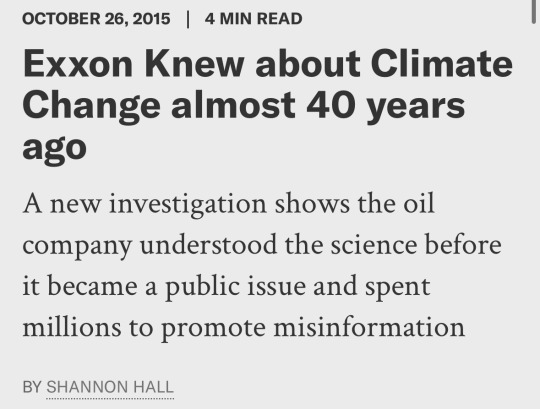
Source
#climate change#fossil fuels#ban fossil fuels#capitalism#climate justice#green new deal#environment#the left#news#current events
539 notes
·
View notes
Note
If the dinosaurs never went extinct then would there still be fossil fuels?
- dinosaurs didn’t go extinct, birds are dinosaurs
- fossil fuels come from fossil plants and marine invertebrates. Dinosaurs are not the source of fossil fuels.
- fossilisation happens regardless of whether or not a species goes extinct, there are fossils of living species. It’s just something that happens to dead organisms in the right conditions
- fossil fuels amass when there’s just giant quantities of dead organic material, like in the Carboniferous Coal Forests. So yeah, they were always going to exist in a world where life does so well.
443 notes
·
View notes
Text
#good news#nature#science#environmentalism#environment#animals#climate change#fossil fuels#heat pumps
2K notes
·
View notes